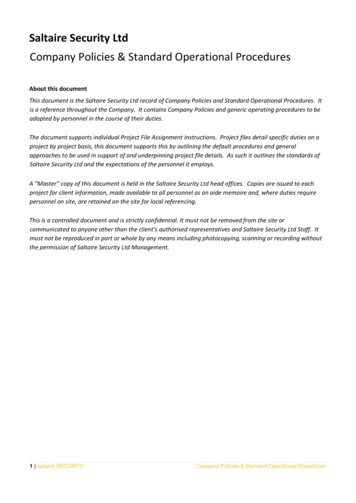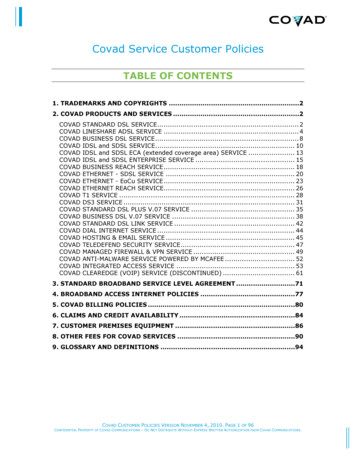
Transcription
Better policiesfor better livesThe OECD at 50 and beyond
Graph Credits :Page 24OECD/Food and Agriculture Organization of the United Nations (2010), OECD-FAO Agricultural Outlook 2010, OECD Publishing.doi: 10.1787/agr outlook-2010-enPage 25OECD (2010), OECD Factbook 2010: Economic, Environmental and Social Statistics, OECD Publishing.doi: 10.1787/factbook-2010-enPage 26OECD (2010), OECD Factbook 2010: Economic, Environmental and Social Statistics, OECD Publishing.doi: 10.1787/factbook-2010-enPage 27OECD (2010), OECD Factbook 2010: Economic, Environmental and Social Statistics, OECD Publishing.doi: 10.1787/factbook-2010-enPage 28OECD (2010), OECD Factbook 2010: Economic, Environmental and Social Statistics, OECD Publishing.doi: 10.1787/factbook-2010-enPage 29OECD (2008), OECD Science, Technology and Industry Outlook 2008, OECD Publishing.doi: 10.1787/sti outlook-2008-enPhoto Credits :Covers, page 6, page 11, page 15, page 19, page 21 : OECD/Michael Dean ; Page 5, page 9 : OECD/Hervé Cortinat ; Page 9 : OECD ; Page 12,page 24, page 27, page 29 : Collection istock photo ; Page 25 : Able images/Photodisc ; Page 26 : Getty Images ; Page 28 : Collection Thinkstock OECD 2011OECD freely authorises the use of this material for non-commercial purposes. All requests for commercialuses of this material or for translation rights should be submitted to rights@oecd.org.
Better policiesfor better livesThe OECD at 50 and beyondwww.oecd.org
The OECD’s core valuesObjectiveOur analyses and recommendations are independent and evidence-based.OpenWe encourage debate and a shared understanding of critical global issues.Bold e dare to challenge conventional wisdom starting with our own.WPioneeringWe identify and address emerging and long-term challenges.EthicalOur credibility is built on trust, integrity and transparency.4
Angel Gurría,OECD Secretary-GeneralForewordAnniversaries are moments for looking back and looking forward. The OECD’s 50th Anniversary is anopportunity to reaffirm what we stand for and what we are about.Since 1961, the OECD has been a policy advisor and pathfinder on important issues forour member countries. Evidence-based policy guidance such as our Jobs Strategy, our PISAstudents assessment in more than 70 countries, and our country reviews in several domainshave helped policy makers and stakeholders to pursue their reform agenda. Our pioneeringwork on climate change and the use of economic instruments to reach environmentalgoals provide useful tools to bring “green” and “growth” together. This experience will beenormously valuable for the delivery of the OECD Green Growth Strategy in 2011.Over the past five decades the OECD has also set globally recognised standardsand established effective processes for ensuring their implementation.Our Guidelines for Multinational Enterprises, our Global Forum on Transparency and Exchangeof Information for Tax Purposes, our Anti-Bribery Convention and our monitoring of aidflows are just a few examples of the ways in which we help to develop high internationalrules of the game in the interests of a stronger, cleaner and fairer world economy.The OECD has also proven that it is a relevant arena to discuss global challenges and to find commonsolutions. Today, as the global economic landscape changes and we build the new institutionalarchitecture of global governance, the OECD will become even more important: through ourcontributions to the G20 in the fields of strong, sustainable and balanced growth, employment andskills, trade and investment, food security, taxation, innovation, anti-corruption and development.But also through a more open, inclusive OECD, taking “on board” new members and defining a newpartnership with emerging economies and working increasingly with and for developing countries.The OECD will continue to ensure that the well-being of citizens remains at the centre of our concerns.After 50 years, our objective is and remains to help member and partner country’sgovernments to formulate and implement better policies for better lives.Angel GurríaSecretary-GeneralOrganisation for Economic Co-operation and Development (OECD)5
6
Table of contentsThe OECD – Working with partners to build a stronger, cleaner, fairer world economy8-9OECD Past, Present and Future – Better policies for better lives10International co-operation – Few carrots or sticks12Some major OECD achievements13Restoring trust and strengthening governance – An urgent challenge14-15Getting back to balanced growth –The struggle to restore government finances and balance the world economy16-17New sources of growth in the 21 century – Fostering innovation and green growth18-19Building the future – Boosting jobs and skills20-21Development co-operation and beyond – Spreading the potential22-23stAgriculture – From rationing to abundance24Education – Investing for a smarter future25Energy – Finding a better mix26Environment – Common sense makes economic sense27Healthy societies – But progress comes at a price28Science and technology – Pathway to the future29For more information30Contact us317
The OECDWorking with partners to build a stronger, cleaner, fairer world economyWhat is the OECD? The letters stand for Organisationfor Economic Co-operation and Development. Thosewords, broadly speaking, sum up what we do. Intoday’s globalised, interdependent world, multilateralco-operation is more important than ever.In simple terms, our mission is to promote policiesthat will improve the economic and social wellbeing of people around the world. Our originsdate back to 1960, when 18 European countriesplus the United States and Canada joined forcesto create an organisation dedicated to globaldevelopment. Today, our 34 member countriesspan the globe, from North and South America toEurope and the Asia-Pacific region. We also workclosely with more than 100 countries, includingemerging giants like China, India, Brazil, as wellas Indonesia and South Africa and developingeconomies in Africa, Asia, Eurasia, Latin Americaand the Caribbean. Together, our goal continuesto be to build a stronger, cleaner, fairer world.The OECD provides a forum in which governmentscan work together to share experiences and seeksolutions to common problems. We work withgovernments to examine what drives economic,social and environmental change. We producehigh-quality internationally comparable dataand indicators and develop key statistics used tounderstand the economy. We measure productivityand global flows of trade and investment. Weanalyse and compare data to predict future trends.We track dynamics of growth and development8at the international scale, at countries’ and at theregional level. We set international standards onall sorts of things, from the safety of chemicals andnuclear power plants to the quality of cucumbers.We look, too, at how much people pay in taxesand social security, and how much leisure timethey have. We compare how school systems arereadying young people for modern life, and howpension systems will look after citizens in oldage. And we look at governments themselves, atall levels; how they shape the economic, socialand environmental landscape for business andcitizens, how open and transparent they are intheir practices, how they produce and delivergoods and services, and how responsible theyare in managing their budgets and finances.Drawing on facts and real-life experience, werecommend policies designed to make the livesof ordinary people better. We work with business,through the Business and Industry AdvisoryCommittee to the OECD, and with labour, throughthe Trade Union Advisory Committee. We consultwith other civil society organisations, notablythrough the annual OECD Forum. The commonthread of our work is a shared commitmentto sustainable growth, employment and trade,based on international co-operation, andfocused on the well-being of all citizens. Alongthe way, we also set out to make life harder forthe terrorists, tax dodgers, and others whoseactions undermine a fair and open society.
Now, as the OECD turns 50, we are focusingon helping governments in five main areas: First and foremost, governmentsneed to restore confidence in marketsand the institutions and companiesthat make them function. That willrequire improved regulation and moreeffective governance at all levels.1961-2011 S econd, governments must reestablish healthy public finances as abasis for future sustainable economicgrowth. In parallel, we are looking for ways tofoster new sources of growth throughinnovation, environmentally friendly‘green growth’ strategies and thedevelopment of emerging economies. To underpin innovation and growth,we need to ensure that people of allages can develop the skills to workproductively and satisfyingly in thejobs of tomorrow.The signing of the OECD Convention Finally, we need to promote inclusivegrowth and sustainable developmentin emerging and developing countriesfor a future in which no country willdepend on aid.These issues are not confined to OECDcountries, and tackling them will requirereinforcing global governance and cooperation, notably through the G20. TheOECD plays a key role in supportingthe G20 with analysis and policyrecommendations on challenges thatinclude promoting stronger and morebalanced growth and defining better andmore effective approaches to development.Annual Ministerial Council Meeting9
OECD Past, Present and FutureBetter policies for better livesThe OECD is celebrating its 50th Anniversary,but its roots go back to the rubble of Europeafter World War II. Determined to avoid themistakes of their predecessors in the wake ofWorld War I, European leaders realised thatthe best way to ensure lasting peace was toencourage co-operation and reconstruction,rather than punish the defeated.The Organisation for European EconomicCo-operation (OEEC) was established in 1947to run the US-financed Marshall Plan forreconstruction of a continent ravaged by war.By making individual governments recognisethe interdependence of their economies, itpaved the way for an era of co-operation thatwas to change the face of Europe. Encouragedby its success and the prospect of carrying itswork forward on a global stage, Canada andthe US joined OEEC members in signing thenew OECD Convention on 14 December 1960.The OECD was officially born on 30 September1961, when the Convention entered into force.Other countries joined, starting with Japanin 1964. Today, 34 OECD member countriesworldwide regularly turn to one another toidentify problems, discuss and analyse them,and promote policies to solve them. The trackrecord is striking. The US has seen its national10wealth in terms of per capita GDP almost triplein the five decades since the OECD was created.Other OECD countries have seen similar, and insome cases even more spectacular, progress.So, too, have countries that a few decades agowere still only minor players on the world stage.China, India and Brazil have emerged as neweconomic giants. Most of the countries thatformed part of the former Soviet bloc have eitherjoined the OECD or adopted its standards andprinciples to achieve our common goals. Russiais negotiating to become a member of the OECD,and we now have close relations with Brazil,China, India, Indonesia and South Africa throughour “enhanced engagement” initiative. Togetherwith them, the OECD brings around its table 40countries that account for 80% of world trade andinvestment, giving it a pivotal role in addressingthe challenges facing the world economy.
OECD member countries(with year of membership )Australia (1971)Austria (1961)Belgium (1961)Canada (1961)Chile (2010)Czech Republic (1995)Denmark (1961)Estonia (2010)Finland (1969)France (1961)Germany (1961)Greece (1961)Hungary (1996)Iceland (1961)Ireland (1961)Israel (2010)Italy (1961)Japan (1964)Korea (1996)Luxembourg (1961)Mexico (1994)Netherlands (1961)New Zealand (1973)Norway (1961)Poland (1996)Portugal (1961)Slovak Republic (2000)Slovenia (2010)Spain (1961)Sweden (1961)Switzerland (1961)Turkey (1961)United Kingdom (1961)United States (1961)11
International co-operationFew carrots or sticksThe OECD achieves results mainly byconvincing governments of the value ofadopting policies that are in their collectiveself-interest. It does not disburse grant moneyand it has no disciplinary powers otherthan moral suasion. When policy proposalsrequire international co-operation to beeffective, agreement is reached by consensus.This takes time but it helps to ensure thatagreements, once confirmed, are respected.Over the years, the OECD has been atthe forefront of efforts to address globalchallenges. Its Model Tax Convention forms thebasis for over 3600 bilateral tax treaties aroundthe world. Principles and frameworks for manyinternational agreements on the environmentwere established at the OECD, such as the“polluter pays” principle in the 1970s. TheOECD began examining how to address theharmful effects of tax havens in the 1990s,which provided a sound basis for the G20 tolaunch a crackdown on them in the midst of12the financial crisis in 2009. It initiated a studyof the public policy implications of the Interneteconomy in 1995, three years before Google wasincorporated and six years before the companylaunched its initial public offering of stock.The boom and bust of the past few yearshave brought new challenges. Some, wehope, will find solutions quickly. Toughaction will be needed to restore healthto public finances, but the task is notimpossible. A revival of economic growthcan help to bring down unemployment.But the events of the recent past havealso prompted searching questions aboutfundamental economic issues. The crisishas highlighted failings in the way financialinstitutions and markets operate but it has alsomade governance failures visible. Restoringtrust and confidence in market economies,effective regulation and strengthenedbusiness ethics has become crucial for thepeople, for the economy, and for our future.
Some major OECD achievements1958 Model Tax Convention onIncome and on Capital OECD Standards for Seeds,Fruit and Vegetables1959 OECD standard codes for theofficial testing of agriculturaland forestry tractors1961 OECD Codes of Liberalisationof Capital Movements and ofCurrent Invisible Operations1963 Frascati Manual1972 Polluter Pays Principle1976 OECD Guidelines forMultinational Enterprises1978 Arrangement on OfficiallySupported Export Credits1979 & 1995 OECD Transfer Pricing Guidelines1980 OECD Privacy Guidelines1981 Mutual Acceptance of Datain chemical testing1987 Producer Support Estimate (PSE) formeasuring support to agriculture1994 OECD Jobs Strategy2008 Declaration on Sovereign Wealth Funds1997 Anti-Bribery Convention2009 Global Forum for Transparencyand Information Exchangefor Tax Purposes OECD Guidelines on HumanBiobanks and GeneticResearch Databases OECD Strategic Responseto the Crisis Invitation to G20 Summits Policy Guidance on IntegratingClimate Change Adaptationinto Development Co-operation1998 Recommendation on EffectiveAction against Hard-core Cartels1999 Corporate Governance Principles Guidelines for ConsumerProtection online2000 First OECD list of Tax Havens PISA2001 Recommendation on Untying Aidto Least Developed Countries2005 Going for Growth OECD Guidelines onCorporate Governance ofState-Owned Enterprises Paris Declaration onAid Effectiveness2007 Accession process of Chile, Estonia,Israel, Russian Federation and Slovenia Enhanced EngagementInitiative (Brazil, People’sRepublic of China, India,Indonesia and South Africa) Invitation to G8 Summits2010 OECD Declaration on Propriety,Integrity and Transparency OECD Guidance for theResponsible Sourcing ofMinerals from Conflictaffected and High-Risk Areas OECD Innovation Strategy Good Practice Guidanceon Internal Controls,Ethics and Compliance OECD Recommendation onPrinciples for Transparencyand Integrity in Lobbying2011 Aircraft Sector Understanding (ASU) OECD Green Growth Strategy13
“A new architecturefor global governanceis emerging to reflectchanging economicrealities. The post-crisisrole for the G20 showshow converging powersare becoming increasinglyimportant protagonists inglobal governance. This isa positive development.Efforts towards makingall institutions of globalgovernance more inclusiveand representative shouldbe sustained.”Restoring trust andstrengthening governanceAn urgent challengeIn the wake of the worsteconomic crisis in decades,one of the most urgent tasksnow facing governments isto restore trust in financialmarkets and in the governanceof the market economy.When the financial systemcrashed, millions of peoplesaw their savings disappear and their livingstandards fall. Stronger governance andimproved regulation are essential if citizens areto regain their confidence in financial markets.Perspectives on GlobalDevelopment 2010The OECD has been working in favour of fairand open markets since it was first created.The OECD Code of Liberalisation of CapitalMovements, adopted in 1961, establishedobligations on participating countries tomaintain free capital movements while providingflexibility to cope with situations of economicand financial instability. Many other agreementsto encourage international investment andpromote fair business dealings have followed.One of the most significant launched in 1976 andregularly updated since, is the OECD Guidelinesfor Multinational Enterprises, published aspart of the OECD Declaration on InternationalInvestment and Multinational Enterprises. TheGuidelines include a mechanism through which14citizens can submit complaints about businessmisconduct. Although not legally binding, theGuidelines act as a global benchmark of corporateresponsibility. They were drawn up in response toa range of concerns at a time when multinationalcorporations were under the spotlight for theiractivities in developing countries, and theycontinue to provide a touchstone for companies’commitment to ethical management.Investment, competition, and markets are global,and efforts to keep them fair and open have tobe global too. That is the approach underlyinganother important OECD instrument, the 1997Convention on Combating Bribery of Foreign PublicOfficials in International Business Transactions.This is a legally binding treaty under which 38governments, including all OECD countries, havepledged to prosecute companies found guilty ofpaying bribes to government officials in orderto win contracts. By criminalising the act ofbribing, the OECD Convention carries the fightagainst bribery to all four corners of the world.The OECD is at the forefront of the fight againstthe misuse of bank secrecy jurisdictions bycompanies and individuals seeking to evade theirtax obligations in their home countries. It workswith the Financial Action Task Force, groupingboth OECD and non-OECD countries, to combatmoney laundering and the financing of terrorism.
The OECD Principles of Corporate Governance, firstpublished in 1999 and subject to regular review,set out the responsibilities of company boardsand their members. The Organisation alsoprovides a platform to encourage co-operationbetween tax authorities and law enforcementagencies to achieve a more coordinatedapproach to counteracting illicit activities.The OECD also recognises that the interfacebetween the public and private spherespresents particular risks of corruption. Weare working with governments to definestandards and practices of integrity in areassuch as public procurement and lobbying,and to prevent the conflicts of interest thatcan arise when an official also has ties to theprivate sector, either while still a member ofthe public service or after leaving such a post.The aim of all these initiatives is to ensureclean and responsible behaviour in businessand government in the interests of a fairersociety. The integrity of businesses, marketsand governments is central to the vitalityand stability of economies. As the financialcrisis demonstrated, banks are more thanjust intermediaries between companies andinvestors. Banks have an impact on the realeconomy and they have responsibilities totheir clients, including ordinary savers. Similarly,companies have obligations to their shareholders,to employees and to the societies within whichthey operate. Governments have an obligationto provide fair and open treatment to citizens,companies and financial institutions alike.Negotiating new rules for international businessand finance will be complex and lengthy. Itwill call for international co-operation andcommitment on the part of government officialsand politicians, but also other stakeholders,including business and civil society. Improvedconsumer protection vis-à-vis banks and financialinstitutions, for example, will bolster confidence infinancial markets. But the ultimate goal is moreambitious. Working with governments and civilsociety, our objective is to forge a fairer societyin which citizens feel safe to pursue projectswithout fear that the system will let them down.15
“It is not simply a questionof austerity versus stimulus,but of targeting and timingpolicies carefully to achievehealthier finances as well assustainable growth. This isan enormous challenge, andwe must get it right.”Angel Gurrìa, OECDSecretary-GeneralGetting back to balanced growthThe struggle to restore government finances and balance the world economyThe economic crisisexposed major and stronglyintertwined imbalances inthe global economy. High leveraging amidunderpriced risk produced a bubble in financialand real estate markets. When it burst, balancesheets of financial institutions got out of kilter.Meanwhile, external positions of countriesdiverged widely, with debtor countries generallyexperiencing inflated asset markets. Theensuing financial turbulence and recessioncaused gigantic fiscal deficits and burgeoningpublic debt.Against a background of rising unemploymentand a still fragile financial system, sovereignrisk has soared, yet governments must continueto run costly services while creating andstimulating the conditions for long-term growth.At the same time, they must press forwardwith financial reform in order to strengthen thestability of the financial system.High, persistent unemployment, in particularamong the young, and government indebtednessare key policy concerns in most advancedeconomies. The persistence of externalimbalances and the surge in capital flows fromadvanced economies - where monetary policy isexceptionally loose - to fast growing, emergingeconomies may act as a destabilising forceglobally. Emerging economies also need to quellthe inflationary pressures associated with supply16constraints and high commodity and food prices,while at the same time tackling inequalities andpromoting an inclusive recovery.For most advanced economies, laying thefoundations for a return to macroeconomicstability requires tough decisions. Fiscalconsolidation - the necessary process of bringingpublic budgets back under control - meansmaking tough political choices about publicexpenditure and revenues. It means reviewingwelfare systems to avoid wastage and strengthenwork incentives, as well as cutting public sectorpayrolls. But it also calls for restoring a healthyfinancial system so as to reduce the risk offurther casualties and to enable the necessaryfunding of future economic growth. Advancedeconomies have to reconcile fiscal consolidationwith sustained growth.Structural policies including innovation policiesand policies for green growth are essential tothis end. Structural reform is also needed inemerging economies to take full advantage ofnew sources of growth and rebalance the globaleconomy. For example, emerging countriesrunning an external surplus need to developtheir systems of social risk- sharing in orderto rein in excessive household saving, anddevelop their domestic financial systems so asto facilitate the funding of business investmentat home. Such reforms will also help to increasetheir resilience to financial shocks and hence
reduce any need for “self-insurance” through themassive build-up of international reserves.At the OECD, countries learn from each other,identifying best practices and finding solutionsto common problems, while at the same timetaking account of possible spill-over effects fromone country or group of countries to another.Periodic Economic Surveys of each membercountry (and selected non-member countries)evaluate economic performance and providepolicy recommendations through a longstandingand widely accepted peer review process. TheEconomic Policy Committee, a body of seniorofficials from finance ministries, economicsministries and central banks provides policyguidance on macroeconomic and structural issues.In this context, the OECD’s twice-yearly EconomicOutlook analyses the economic situation andshort-term prospects and the annual Goingfor Growth publication provides a catalogueof recommendations for structural reformsin individual countries, along with a checkliston how countries have responded to them.The OECD also contributes to the G-20, thesingle-most important global platform for thecoordination of economic and financial policies.One of the biggest pressures on public budgetsin coming years will come from the fact thatpopulations are getting older, thanks in largedegree to better healthcare. But what is goodnews for individuals and families, “it is notsimply a question of austerity versus stimulus,but of targeting and timing policies carefully toachieve healthier finances as well as sustainablegrowth. This is an enormous challenge, andwe must get it right,” says Angel Gurrìa, OECDSecretary-General.To assist governments in their day-to-day budgetmanagement, an OECD Working Party of SeniorBudget Officials is developing Principles forbudgeting covering key areas such as fiscal rules,economic forecasts, medium-term expenditureframeworks, top-down budgeting and long-termbudget projections. Governments adopting thesePrinciples will undertake to share informationon their strategies for fiscal consolidation andprovide regular updates on their impact on theirpublic finances.Similarly, the OECD is supporting governmentsin the strategic design of their domestic andinternational tax policies as well as how toimprove the effectiveness and efficiency of theirtax administrations to restore public financeswithout jeopardising economic growth. Thiswork is helping countries to develop growthoriented tax reforms that seek not only tominimise distortions by the tax system butalso to create as few obstacles as possible toinvestment, innovation, entrepreneurship andother drivers of economic growth.If the objectives underlying the OECD’s work inthese areas can be achieved, governments willhave better public finances, and individuals willenjoy fairer tax systems with safer pensions andmore effective public services.We also support a network on fiscal relationsthat aims to ensure that good practice in taxpolicy and budgeting also responds to thecritical challenges faced by local and regionalgovernments. Sound budgeting combined withmore efficient delivery of public services shouldmean, in the long term, more stable societies,happier citizens and more productive andfulfilling lives.17
“To re-boot the economy,we need new sourcesof growth, driven byinnovation and greenpatterns of consumptionand production. A newgrowth model for the 21stcentury requires a strongsocial dimension. The crisisrevealed, in particular, theneed for more innovativesocial policy making.”New sources of growthin the 21 st centuryFostering innovation and green growthAngel Gurría, OECDSecretary-GeneralNew ways of organisingour lives are changing howwe produce and consume.In the years ahead,spectacular inventionsdue to progress in scienceand technology that wecannot as yet envisage will produce newopportunities for improved prosperity. Byharnessing new technologies in responseto social and economic needs, we can boosteconomic activity and create new jobs.But we also must be vigilant to avoidrepeating the mistakes of the past. Toachieve a robust recovery, we need growthwithout environmental damage andwithout worsening social inequalitiesand regional imbalances. That meanstaking a path radically different fromthat of the countries that industrialisedin the 19 th and 20th centuries.Innovation holds the key to environmentallyand socially sustainable “green” growth. Oneof the main challenges will be to protectand conserve the ecosystems on which wedepend for our well-being. In the struggleto counter climate change, biodiversityloss and other forms of environmentaldegradation, everyone has a role to play.18The OECD’s Innovation Strategy providesa roadmap for policies to encourageinnovation in all areas of the economy. ItsGreen Growth Strategy sets out guidance forways to foster green growth. Governmentsin both developed and emerging economiesmust empower companies and individualsas actors in the quest for green growth.This will mean removing obstacles to theintroduction and commercialisation of newtechnologies and the development of newmodes of production. It will mean encouragingpeople to work and live differently.Energy and transport will be among the firstsectors to target greener growth. But all sectorswill be affected, from urban planning to farming.The OECD’s role will be to help governmentsset the ground rules and create appropriatemarket frameworks to mobilise the talent andinsights of commercial entrepreneurs. Trendsin corporate and consumer demand, fosteredwhere appropriate by green taxes and resourcepricing, can help to guide innovation effortstowards the areas most likely to produce tangibleenvironmental gains. A recent OECD study showsthat leading companies are increasingly shiftingto a “low-carbon business model”, starting withmeasuring their greenhouse gas emissionsand then taking
Agriculture – From rationing to abundance 24 Education – Investing for a smarter future 25 Energy – Finding a better mix 26 Environment – Common sense makes economic sense 27 Healthy societies – But progress comes at a price 28 Science and technology – Pathway to the f










